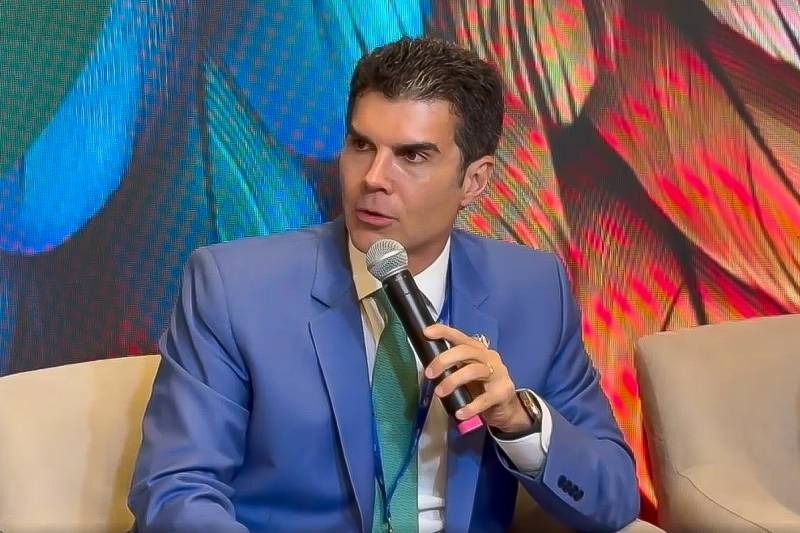Helder Barbalho said IICA is an important instrument and international partnerships are essential to change the concept of land use, implementing regenerative agriculture actions to restore degraded areas so they can produce food, create green jobs and guarantee sustainable production.

Dubai, United Arab Emirates, December 11, 2023 (IICA). Helder Barbalho, the Governor of Pará, the state in the Brazilian Amazon selected to host COP30 in 2025, emphasized that the Inter-American Institute for Cooperation on Agriculture (IICA) and its ecosystem of local, regional and international partners have an important role to play in the most important strategy for combining environmental conservation with social development: the targeting of land use.
Barbalho spoke at an event on the transition to a low-carbon economy in Brazil, organized by his country’s largest business association, the National Confederation of Industry (CNI), which was attended by members of Congress and representatives of Middle East investment funds. The Governor of Mato Grosso, Mauro Mendes, also took part.
“Land use is the core element in the strategy that combines environmental conservation with social development. Amazonia should perform a twofold role, contributing both to environmental conservation and food security. And IICA is an important instrument and international partnerships are essential in changing the concept of land use, implementing regenerative agriculture actions to restore degraded areas so they can produce food, generate green jobs and guarantee sustainable production,” Barbalho said.
“This is a decisive strategy. That is why Pará has a goal of restoring 140,000 hectares of land working with 4000 family farming families, to ensure these families are in a position to produce sustainably, guaranteeing them income and caring for and conserving the environment,” he explained.
The Director General of IICA, Manuel Otero, mentioned the Institute’s Living Soils of the Americas initiative, which is of strategic importance for the hemispheric organization, and said it stood ready to be of service to Governor Barbalho and the agricultural, scientific, academic, and private sectors of Pará and the Amazon.
“The platform was created to raise countries’ critical awareness of the fact that, unless soil degradation is addressed very seriously, whatever else we may do to improve food security will be meaningless. Regions and countries are beginning to share their experiences in restoring soils. This is a step in the right direction. People realize that, as soils degrade, poverty increases, and the only option for vulnerable sectors is to flee those degraded areas.”
The state governor, who has a very full schedule at COP28, also observed that, on the road to COP30, “we’ll be meeting our goals, combating illegal actions, and strengthening environmentally sustainable agendas that can create jobs by addressing environmental challenges along with social challenges.”
He also said that the Amazonian COP “is an opportunity for Brazil to leave a legacy. An environmental legacy. To build environmental solutions based on the value of the rainforest. For the first time, rainforests will be top of the COP agenda. When we talk about rainforests, we need to talk about everything that revolves around rainforests. Trees, people, the biome, biodiversity, opportunities. And Brazil has homework to do before 2025. It must seize the opportunities to build environmentally correct solutions, prepare the country for the ecological transition, make the living tropical forest more valuable than dead forest, achieve the NDCs, and show that Brazil is a country committed to delivering and is serious about delivering. Above all, we have to have enough credibility to be able to say to the rest of the world that Amazonia can provide a solution, but for that it needs support in the form of climate funding, because the solution has to be both environmental and social.”
He called on his country to “combat illegal actions in order to achieve zero emissions, build an environment for the introduction of green economies, and thus make the ecological transition and, particularly in Amazonia, the transition in land use. And equip Belém to be a welcoming, hospitable host, without trying to be Dubai, which has its buildings and its riches that make it world famous.” He concluded his remarks by saying that “we have the rainforest, and the rainforest must be our greatest treasure and our greatest asset, along with the people of Amazonia. It will be a unique opportunity to discuss Amazonia with our feet in Amazonia.”
Recently, in the Brazilian city of Manaus, IICA presented the International Cooperation Initiative and Partnership for the Sustainability of the Amazon to governors and senior officials from the region, in order to promote discussions focused on the region’s conservation and ways of ensuring that the local population is the main actor in decision-making on public policies for the Amazon.
The objective of the Amazon Initiative and Partnership is to work in the region to strengthen sustainable management practices, promote economic diversification, recognize and value ancestral knowledge, achieve scientific recognition and technological innovation, and promote the production of bioinputs, economic incentives for natural resource conservation, regional cooperation and know-how, environmental education, and awareness building.
The Amazon rainforest covers an area of 6.7 million square kilometers, more than 60% of which is Brazilian territory. The region has the greatest biodiversity of flora and fauna on the planet.
More information:
Institutional Communication Division.
comunicacion.institucional@iica.int











